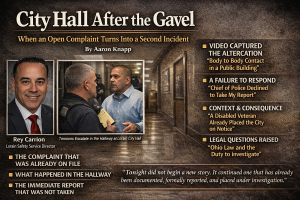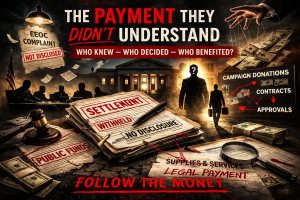Episode 1: The Fallout Begins — Retaliation or Accountability?

A Serialized Investigative Series by Aaron C. Knapp
In the first detailed episode of our Substack investigative series, Inside the Blue Wall: The McCann-Middlebrooks Files, we dive into the earliest stages of what would become a storm of internal complaints, counter-complaints, and explosive allegations at the highest levels of the Lorain Police Department. This episode provides not just the timeline — but the psychological battlefield — of what happens when loyalty, leadership, and the law collide in a department divided.
“I Was Silenced in the Room”: The January 15 Meeting
According to Captain Corey Middlebrooks, the conflict began in earnest during a disciplinary meeting on January 15, 2024. He was handed a formal reprimand by Chief James McCann. The room was filled with power: Chief of Staff Soto, Safety-Service Director Rey Carrion, Captain Failing, and McCann himself. Middlebrooks alleges that the reprimand was riddled with “embellishments,” “inaccuracies,” and “outright lies.” When he attempted to respond, he said McCann continually interrupted him.
Thanks for reading Aaron’s Substack! Subscribe for free to receive new posts and support my work.
Requesting to speak privately with Soto and Carrion, Middlebrooks claimed he used that moment to share concerns about McCann’s intentions — specifically using the phrase “nefarious intentions.” According to Middlebrooks, this is the point at which he crossed a line — not procedurally, but politically. It was no longer just about the reprimand. It was about what he knew, what he said, and who he said it to.
Chief McCann would later argue that this was just a deflection from Middlebrooks’s own failings. But from Middlebrooks’s point of view, the retaliation began here.
“Public Record or Public Humiliation?”: The Reprimand Disclosure
Shortly after the January 15 meeting, Middlebrooks alleged that McCann showed his written reprimand to Officer Antonio Baez, a subordinate. The justification? According to Middlebrooks, McCann claimed it was a public record. When challenged, McCann reportedly said, “File a complaint,” and walked out.
In his OPS interview, Chief McCann did not deny the act. Instead, he justified it as an effort to correct misinformation Baez was allegedly spreading to school staff — arguing Baez “needed to see the second side of the coin.” McCann insisted the disclosure was not meant to humiliate Middlebrooks, but to stop Baez from spreading rumors. He even stated, controversially, that the document could have been posted on Facebook.

OPS flagged that while disciplinary documents are indeed public records under Ohio law, the method and context of disclosure raised ethical red flags. The Chief’s statement — “We don’t show that to anybody. It took extraordinary circumstances” — underscored just how unusual the move was.
OPS concluded that the act may not have technically violated law or CBA provisions, but it shattered norms of professionalism and likely eroded morale within the department.
“Not My Office Anymore”: Allegations of Petty Retaliation
Middlebrooks was reassigned to Support Services, which he described as a punitive demotion. His new office had formerly been used as a storage space. His request to take his desktop computer was denied, and he claimed it took weeks to get a working computer — only a refurbished unit that couldn’t print from his laptop.
OPS found that Middlebrooks never submitted an IT ticket and failed to explore basic troubleshooting steps, like plugging his laptop into the city’s network. Chief McCann argued this was yet another instance where Middlebrooks had to be “told what to do at every turn.”
Still, the optics remained questionable: reassigned to a lesser-known division, stripped of standard office equipment, and assigned to a physically inferior space. To Middlebrooks, this was retaliation, plain and simple. To McCann, it was accountability.
“Show Me the Evidence”: Burden of Proof Begins
In his first Garrity interview, Middlebrooks painted a picture of systemic hostility and professional sabotage. He claimed to be isolated, disrespected, and denied the same support or resources as his peers. But when OPS pressed him for hard evidence, the answers unraveled.
He admitted to signing an EEOC complaint falsely stating that Chief McCann had demoted him — a procedural impossibility since only the Safety Service Director can issue a demotion. When asked what laws had been violated by the reprimand disclosure, he could not cite any. When asked if he believed his treatment was racially motivated, he vacillated.
OPS officials warned him that “buzzwords are not enough.” Retaliation, whistleblower, racism — these are serious terms requiring serious proof.
Middlebrooks conceded that he had not filed a grievance regarding the reprimand. He admitted to never reporting many of the incidents he now cited. And in a particularly damning moment, he acknowledged that some of the alleged retaliation — including a supposed threat against a superior — was never reported until months after his demotion.
OPS Director Williams laid it bare: “Why can’t you admit accountability?”
Final Thought: A Manufactured Failure?
As we close Episode 1, a disturbing pattern begins to emerge. For every allegation Middlebrooks makes, McCann has a rebuttal — but often one steeped in personal judgment and biting rhetoric. Words like “lazy,” “incompetent,” and “needing to be told everything” dominate McCann’s narrative. Yet for all the alleged failures, Middlebrooks was once deemed capable enough to rise through the ranks, attend high-level meetings, and supervise major divisions.

And then there’s the racial disparity: Middlebrooks is one of the few Black command-level officers in a department with a long and complicated racial history. While McCann dismisses all claims of discrimination, we must ask — is there an unspoken pattern here? Middlebrooks says he received less support, was held to different standards, and was ultimately isolated and humiliated in ways his white peers never were. He wasn’t just reassigned; he was undermined.
Is it possible that what we are witnessing is not just the unraveling of a career, but the deliberate dismantling of it? Is Middlebrooks being scapegoated — not just for internal dysfunctions, but for daring to challenge them while Black?
This is the question that now defines the series.
Coming Next: The Dispatch Directive and “Unprecedented Performance Testing”
In Episode 2, we explore Middlebrooks’s claim that his reassignment to the Dispatch Center and Records Division was a form of institutional humiliation — a task never asked of other Captains. OPS would later call his accusations a mixture of misinterpretation and inexperience. But what really happened?
Stay tuned. We’ll continue to unpack this multi-layered internal investigation, one conflict, one memo, one interview at a time. In the process, we’ll ask: is this a case of systemic retaliation — or of a department trying to hold one of its own accountable, only to face the political consequences?
👉 Subscribe to follow the full investigation






